Latest News
Faith-based organizations across Asia are mobilizing around Turn Debt Into Hope, a global campaign calling for debt cancellation, climate justice, and an end to development models that deepen ecological harm. Anchored in the Jubilee 2025 process, the campaign argues that unsustainable debt and environmental destruction are structurally linked—and that countries most affected by climate change should not be forced to finance their own survival.
Support for the campaign has steadily grown in the region. Caritas organizations from the Philippines, Indonesia, Cambodia, India, Bangladesh, Timor Leste, Taiwan, Malaysia, Thailand, Macau, Kazakhstan, Kyrgyzstan, and CHARIS Singapore have formally signed the petition. Their institutional endorsements are reinforced by individual signatories from the Philippines, Malaysia, Cambodia, and Bangladesh, reflecting grassroots engagement alongside organizational leadership.
The campaign has also drawn backing from prominent environmental advocates. Four Asian recipients of the Goldman Environmental Prize - Batmunkh Luvsandash of Mongolia (2025), Delima Silalahi of Indonesia (2023), Alok Shukla of India (2024), and Fr. Edwin Gariguez of the Philippines (2012) - have endorsed the petition. Philippine Senator Risa Hontiveros is likewise among the signatories, signaling growing political attention to the issue.
Ecclesial support has expanded in parallel. The Catholic Bishops’ Conference of the Philippines, together with priests and bishops from India, Japan, Bhutan, Vietnam, and Thailand have aligned themselves with the campaign’s core demands. At the regional level, the Federation of Asian Bishops’ Conferences (FABC) and its Office for Human Development / Commission on Climate Change and Development (FABC–OHD/CCD) have consistently advanced calls for the recognition of ecological debt and just climate finance.
The theological and pastoral dimensions of the campaign were highlighted during The Great Pilgrimage of Hope Conference: Integral Ecology in Laudato Si’ in Asia, held in Penang, Malaysia, from November 27–30, 2025. In his presentation, Bishop Gerardo A. Alminaza of San Carlos, Philippines, situated debt justice within the broader realities facing Asia: worsening climate impacts, expanding extractive industries, and persistent governance failures that disproportionately affect the poor.
Alminaza emphasized that ecological debt cannot be addressed through technical solutions alone. Drawing on Laudato Si’ and Asian spiritual traditions, he argued that environmental destruction is rooted in moral failure—manifested in corruption, extractivism, and financial systems that externalize ecological costs while indebting vulnerable communities. He underscored the principle of Common But Differentiated Responsibilities (CBDR), calling on historical polluters and wealthy economies to assume greater responsibility for climate finance, loss and damage, and reparative action.
At its core, Turn Debt Into Hope is advancing a clear set of demands: the cancellation of unjust and unsustainable debts, an end to climate loans that deepen dependency, and the redirection of financial systems toward ecological restoration and social protection. For faith-based institutions, the campaign also raises internal questions. It challenges churches in Asia to align advocacy with practice—through fossil-fuel divestment, ethical financing, and the refusal of funding tied to extractive and destructive industries.
As the campaign moves forward, its impact will be measured not only by signatures gathered but by the degree to which Asian churches translate moral positions into institutional reform. In pressing for debt justice, Turn Debt Into Hope is testing whether the Church in Asia can move from solidarity statements to structural accountability—at a time when ecological and economic pressures leave little room for delay.
Jing Rey Henderson
Let's #turndebtintohope one signature at a time.
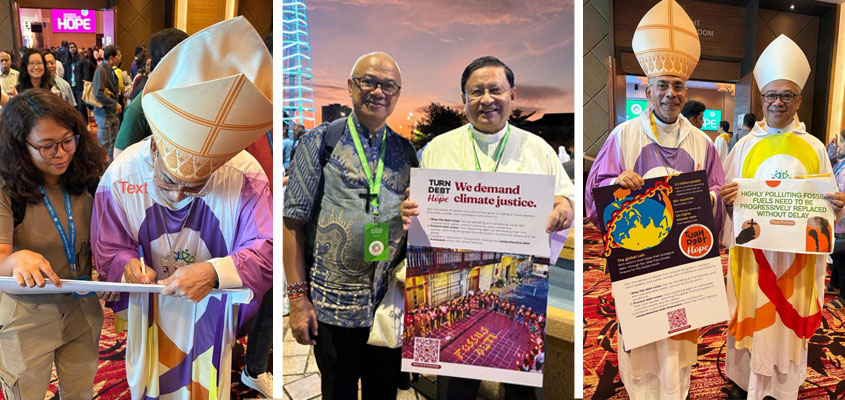
Merciful Father, you are refuge and strength of all who suffer. We leave up to you those afflicted by natural disaster and human conflicts, those who have lost homes, loved ones and hope in the face of calamity. Embrace them with your love, heal their broken hearts, and restore their spirit. Inspire us to stand in solidarity with them, empowering their community to rebuild with dignity and courage.
We pray for the leaders and authorities in all countries to bring harmony where there is division, justice where there is oppression, and hope where there is despair. Grant them wisdom to seek dialogue, strength to uphold truth, and compassion to support people. May their work reflect Your call to be peacemakers, fostering unity and empowering community to shape our future of justice and love.
Loving Father, you call us to love our neighbors as ourselves. We pray for humanitarian aid workers who risk their lives to bring relief and hope to those in crisis and living in IDP camps. Protect our humanitarian workers, our colleagues and our volunteers from harm. Fill them with your grace and guide their hands to uplift local communities as partners and leaders.
May they selfless service shines as light in the darkness, uniting the world in your compassion.
We make our prayer through our Lord Jesus, Your son who lives and reigns with You in the unity of the Holy Spirit, God, forever and ever, Amen.
“Caritas Asia with her Member Organizations, stakeholders, well-wishers and communities mourn for the death of our Loving Holy Father-POPE FRANCIS” We join the world community in mourning and prayer.
The world stands in shock and awe at the sudden passing of our Holy Father- Pope Francis, a leader whose presence radiated compassion, courage, unwavering Hope and faith. His death has left a profound void in the hearts of millions across the world; people of all faiths and walks of life who were touched by his authenticity, his relentless pursuit of peace, and his deep love for humanity and the creation. In a time marked by division due to greed for power, fame and uncertainty, he was a cementing force of unity and hope. As we mourn this immense loss, we also remember the life and light he shared — a light that will continue to guide us in our journey toward justice, mercy, hope and care for our common home. For Asia Region, he had left us a fresh impression with his recent trip to the region in 2024.
“Your Footprints are fresh and reminding us to follow your footsteps- Holy Father”.
We join our hands in gratitude and prayer for his great leadership: God our loving father we thank you for the life and leadership of His faithful servant, who led his flocks with authenticity, honesty, and a heart full of grace and compassion.
Blessed with charisma, vision and empathy, he strove for peace and harmony, embracing all people and all creation with deep care.
May his legacy inspire us to serve selflessly, to build an inclusive world and to continue to follow his footsteps of caring for all and our common home.
Grant his soul eternal rest and may heaven open and angels welcome his soul. Amen.
(photo from Caritas Internationalis media)
Your Eminences, Excellencies, Respected Participants, Dear Friends and Colleagues,
Firstly, on behalf of Caritas Asia member organizations, I would express my deep condolences and offer prayers for the families and communities impacted by the recent earthquakes. We also would affirm our unwavering support for the affected people.
Secondly, we will continue to accompany the church leaders and Caritas colleagues, starting from the community, parish, diocese and national levels with our prayers so that they can do their best in providing the humanitarian services respecting the preferences of the local community, observing the required policies of the governments, maintaining the international standards, and, above all, the principle of inclusiveness.
Thirdly, thanks to all colleagues of CI, Caritas Global Member Organizations who have already been active with their various emergency assessments and supports, and to those Caritas Member Organizations who are mobilizing resources to be active soon for assisting our brothers and sisters needing life-saving support. My sincere requests to you all are:
- to follow as much as possible the Single Results Framework developed by KMSS/Caritas Myanmar and CRS;
- to ensure strict implementation of safeguarding guidelines at all levels, and with all stakeholders; and
- to be better coordinated by the national Caritas – KMSS/Caritas Myanmar.
Let us all be inspired by the call of our Holy Father, Pope Francis to join the people of
Myanmar in solidarity as they face another crisis following earthquakes. In solidarity and prayer,
Benedict Alo D’Rozario, President, Caritas Asia
More Latest News
Caritas Videos
-
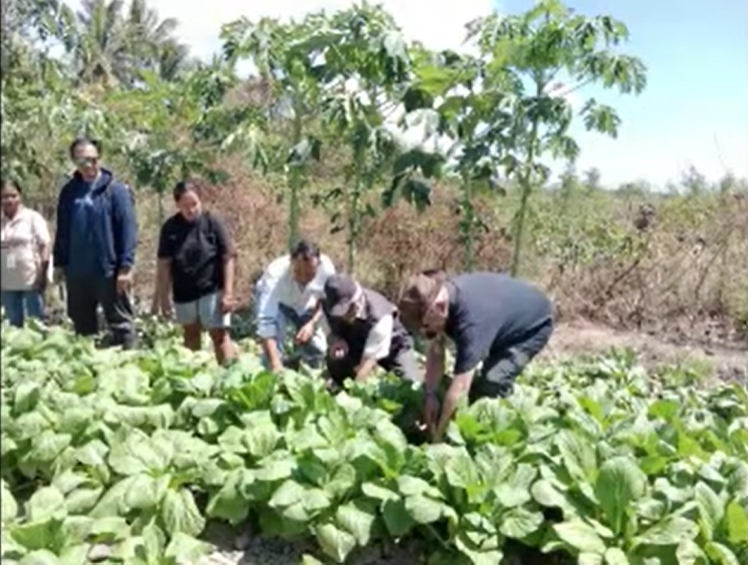
It is a story of Horti-Bilau, a group of rural farmers in a village called Uma Naruk, with 10 families involved as group members. Before starting the group, they worked as individual farmers, but they continued to face the problems due to lack of agricultural production, lack of food, lack of money, and the inability to finance their children’s education, and their individual income was very low (minimal). They agreed to create a group in their village to develop their own agricultural and aquaculture activities through the support from Caritas Diocesan of Baucau and in partnership with Caritas Australia.
-
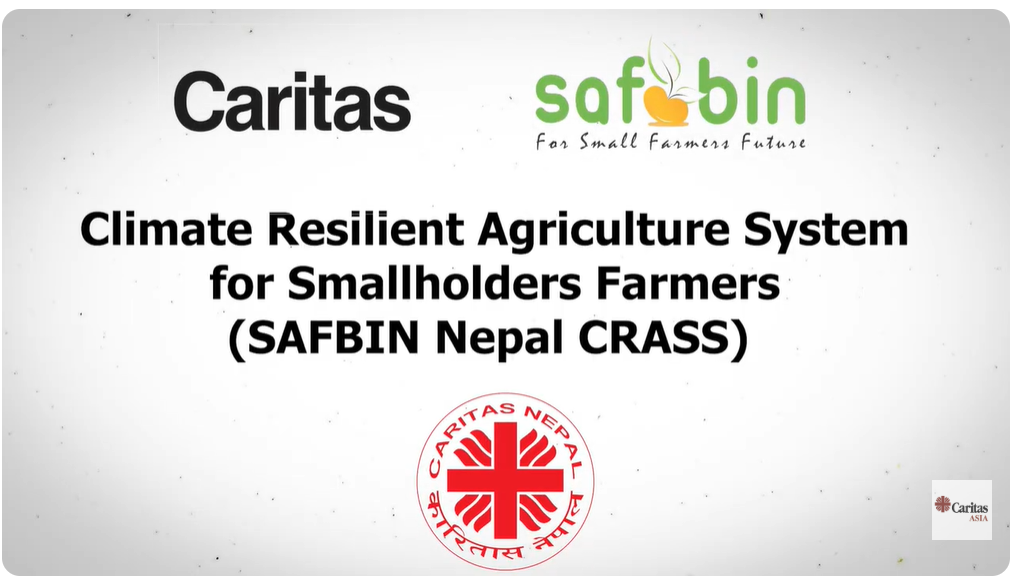
Poultry farming has a long history in Nepal and is one of the traditional agricultural practices of the communities. It holds an important place in the rural economy. Caritas Nepal, in collaboration with SAFBIN project, distributed five chickens to a famer in Kawasoti Municipality, Nawalparasi District under the Climate Resilient Agriculture System for Smallholders Farmers (CRASS) to provide the family with an opportunity to begin a new venture in agriculture. After two years of hard work and dedication, the five chickens given in the beginning of the program has now grown to 130 chickens and it brought significant changes to the family’s daily life. #SafeFoodforAll #FoodHero #WorldFoodDay2025
-
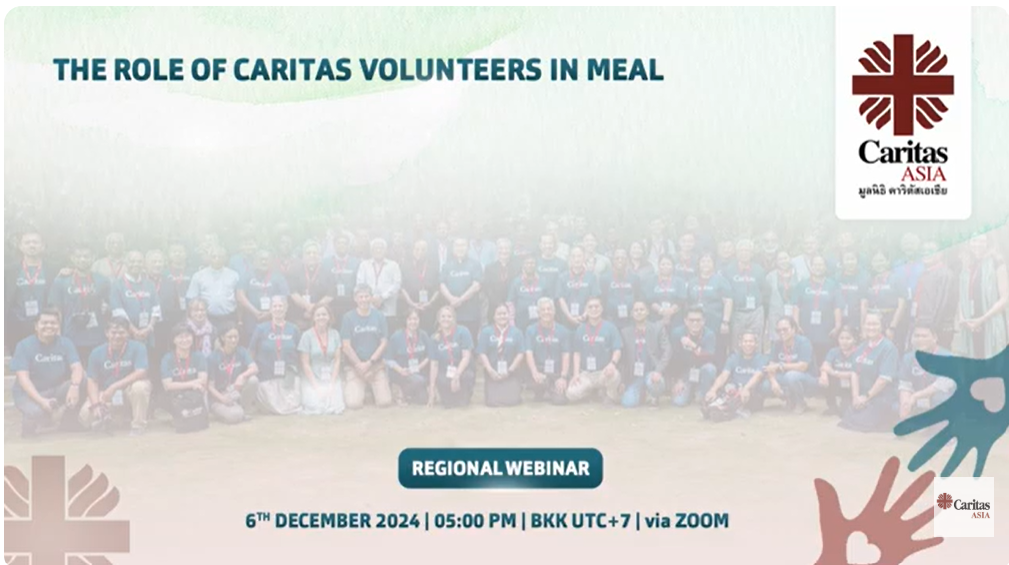
Caritas Asia organized a regional webinar highlighting Caritas volunteers’ roles related to Monitoring, Evaluation, Accountability and Learning (MEAL) on the occasion of International Volunteers Day DRR (December 5th)
-
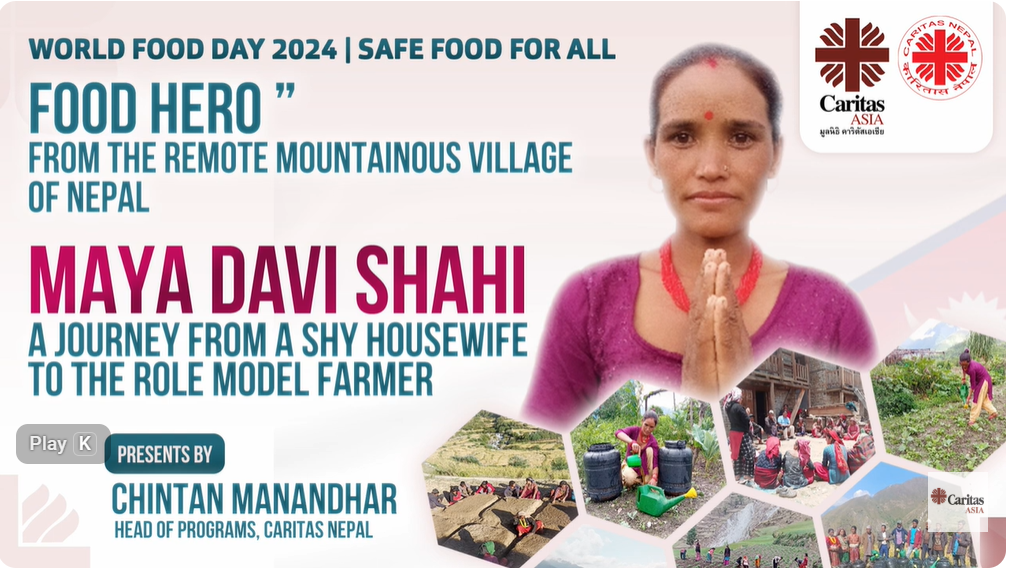
Chintan Manandhar, @nepalcaritas Head of Programs, shared a wonderful story of the local food hero from the remote mountainous village of Nepal. This webinar was organized on 17 October 2024 and is a part of Caritas Asia's #SafeFoodforAll campaign in the 2024 World Food Day Celebration.
-
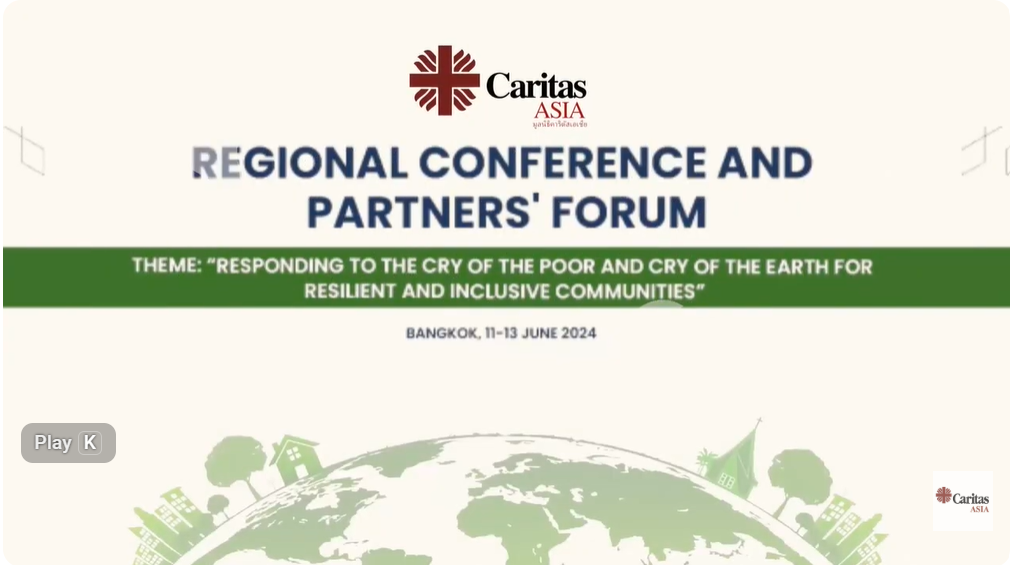
Watch inspiring voices from across Asia in this video recap of the #CaritasAsia2024 Regional Conference and Partners' Forum! Hear from Caritas Internationalis, Caritas Asia and passionate delegates as they share their commitment to building resilient and inclusive communities that respond to the cries of the earth and the poor. #TogetherWe
-
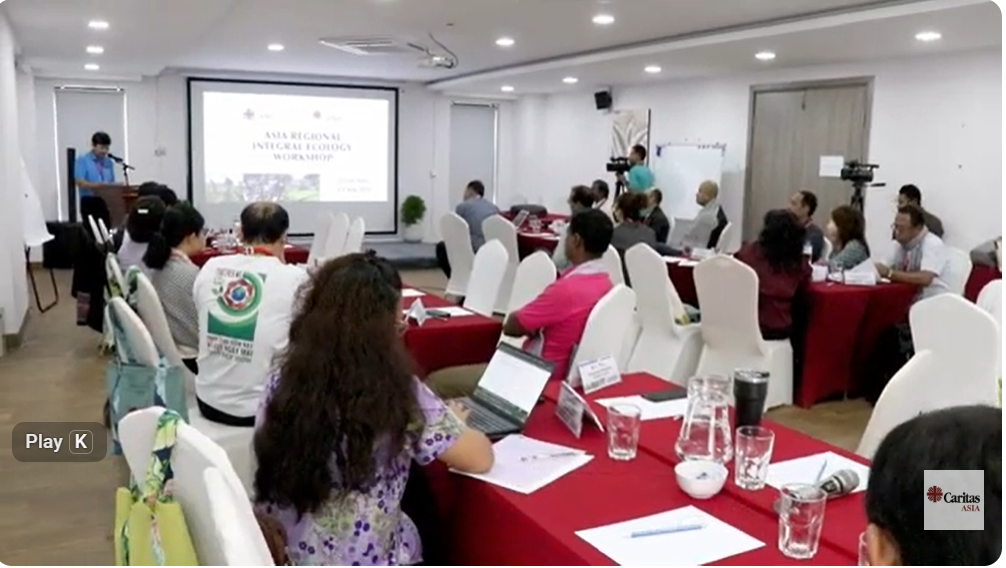
Asia Regional Workshop on Integral Ecology Phnom Penh, Cambodia, 2-5 May 2023
-
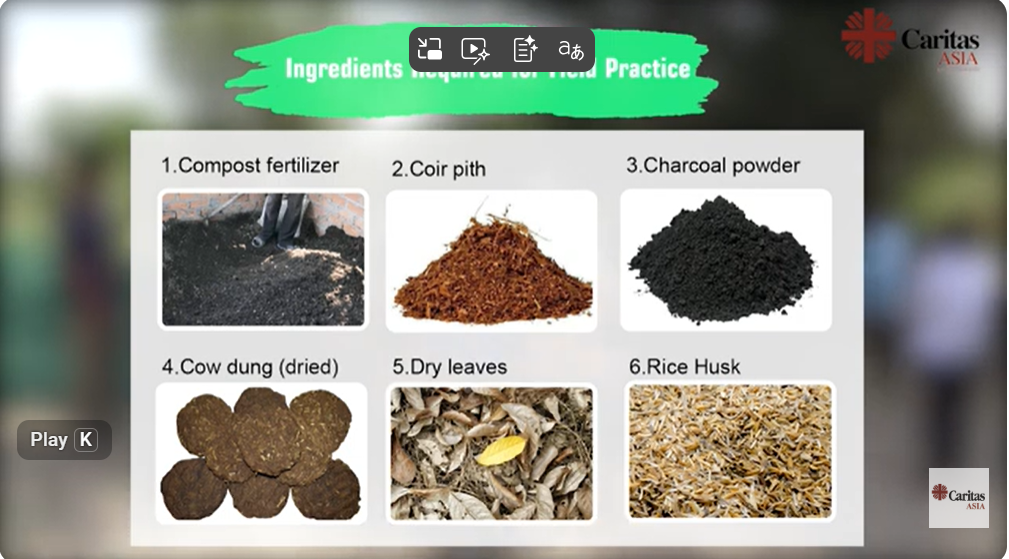
The demo video was taken in Kampong Thom, Cambodia during the Asia Regional Workshop on Integral Ecology, 2-5 May 2023.
-
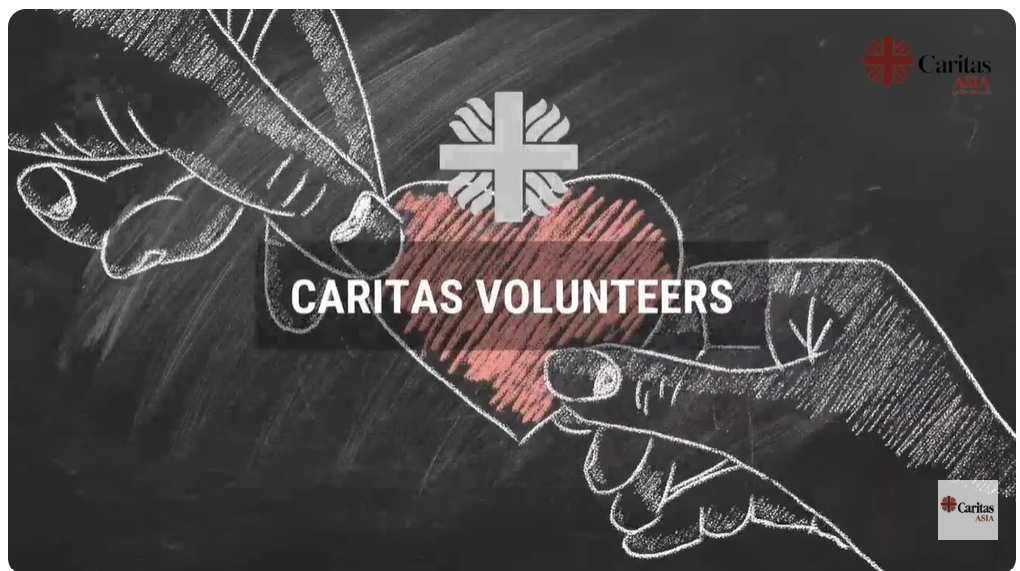
The video is created to celebrate the International Volunteers' Day (Dec 5th) and to acknowledge the crucial role of volunteers who journey together in the past 70 years with the confederation and shape Caritas services around the world.
-

Caritas Asia_IDDRR 2021
-

CI General Secretary's Message for Caritas Asia Webinar on World Humanitarian Day
-

Caritas Asia is collaborating with Caritas India to address the issues around climate change and how it has led to increasing series of disasters leading to a higher increase in demand for humanitarian work and aid across the world. In the midst of the ongoing pandemic humanitarian relief, Caritas Member Organizations in Asia are still actively responding to the climate-induced disasters, including Caritas India who has been working closely to understand the elements of climate change and humanitarian work with the communities with its recent years of approach of the four pillars. From community based to community led has been a transitional phase of work that the organization have been continuously working upon and integrating it within the systems. Opening Prayer: Leeza, Anti Human Trafficking and Migration Lead, Caritas India Welcome Address: Dr. Dr. Benedict D’Rozario, Caritas Asia President. Context Setting: Fr. (Dr.) Paul Moonjely, Caritas India Executive Director Keynote Address: Aloysius John, Caritas Internationalis General Secretary Speaker 1 - Global Climate Emergency: Ms. Clare Westwood, Regional Director of the Episcopal Commission for Creation Justice of Malaysia, Singapore & Brunei Speaker 2 - Emerging New Humanitarian in COVID times, Prof. N. Vinod Chandra Menon, Founder Member, National Disaster Management Authority Speaker 3 - Future of Climate Emergency and the Power of Localization, Fr. Antonio Labiao Executive Secretary, Caritas Philippines Open Discussion and Sharing: Ari Nugroho, Caritas Asia Program Officer Conclusion & Vote of Thanks: Ms. Ghanshyam Jetwa, Caritas India Head of Program
-

A message from Cardinal Tagle Message to Caritas Member Organizations in Asia in an Asia Regional Webinar celebrating the World Humanitarian Day, August 19th, 2020.
-

Ms. Dhan Kumari Chaudary shared the challenges faced by smallholder farmers facing the impact of COVID-19, shared during Caritas Asia Regional Webinar on Prospects of Regenerating Sustainable Agriculture in the Context of COVID-19 held on June 11, 2020. Thank you to Caritas Nepal team in preparing this video.
-

Caritas Asia Regional Retreat for Directors 7 - 9 Oct 2019
-

3rd National Interfaith Forum Against Human Trafficking event in Phnom Penh Cambodia.
-

Ms. Christine Wong of Caritas Singapore represented Caritas Members in Asia addressing the 6 expectations to the 21st General Assembly in Rome, 24 May 2019.
-
CARITAS ASIA AT A GLANCE
-
AsiaSharetheJourney
-
-

-

-

-



































